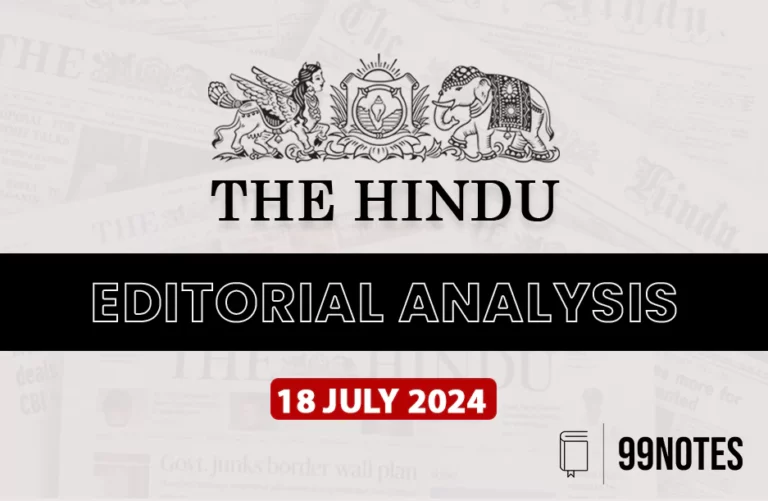8 May 2023 : The Hindu Editorial
False narratives and propaganda should be countered, but not through a ban.
Topic: GS2.
Context:
- The demand to ban the movie The Kerala Story has raised issues regarding curbing false narratives and propaganda that affect the social fabric.
Issue:
- The demand for a ban on The Kerala Story, a film based on the instances of a few women joining the Islamic State, is ill-conceived.
- The Supreme Court, the High Courts of Kerala, and Madras did not yield to the clamour for proscribing the movie.
- The film’s fictional content has been denounced as undisguised propaganda, but banning it would be counter-productive.
- Courts can overturn bans and evoke curiosity about the film, making more people form opinions on its content, enhancing the propaganda value, and furthering the ulterior motive.
Measures that should be taken:
- Once a film has been certified by the statutory authority, there is no case to ban it.
- The local authorities must provide adequate security and carefully assess the ground situation before making a decision.
- Attempts to make political and electoral capital out of the film are condemnable. The fear the film purportedly grapples with — that young people may be targeted for radicalisation — should be addressed by isolating extremist elements and fostering better understanding among communities.
- The mischief wrought by a false projection of reality is best undone by exposing the falsehood and underlying motive, not through hasty bans.
Ways to prevent false narratives and propaganda:
- Expose the falsehood and the underlying motive through fact-checking and providing accurate information.
- Foster better understanding among communities by promoting dialogue and engagement.
- Isolate extremist elements that spread false narratives and propaganda.
- Encourage media literacy and critical thinking skills to help people identify and question false narratives.
- Avoid hasty bans that can have counter-productive effects and instead rely on legal processes to address harmful content.
With COVID-19 ‘over’, applying the lessons learnt.
Topic: GS3.
Context:
- The World Health Organisation declared on May 5, 2023, that COVID-19 is no longer a public health emergency of international concern and has become an endemic disease.
- It is essential to take lessons from the COVID-19 pandemic and be future-ready.
Issue: Misinformation during the second wave:
- In April-May 2021, a misinformation campaign in India claimed a “third wave” of COVID-19 would disproportionately affect children.
- This led to school closures and mandatory mask-wearing for children, which persisted even as COVID-19 became endemic.
- The Foundation for People-Centric Health Systems analysed social media and news reports from India and abroad to understand the opinions of experts and influencers.
- Trained public health experts and epidemiologists largely opposed school closures and mandatory mask-wearing for children.
- Super-specialists were more supportive of these measures.
- Media personalities and parents had mixed opinions, but news stories often catered to their audience.
- Experts and influencers living outside India were more likely to support school closures and mandatory mask-wearing for children, despite little evidence to suggest that children are at high risk for COVID-19.
- Problem with the Editorial: It does not consider that children could have still acted as the carrier of the Corona Virus.
- At the endemic stage, there is no role for universal and mandated mask-wearing for any age group.
Significance of local context;
- Local context is crucial in determining policy interventions and preventive advice in outbreaks and epidemics.
- Some countries have made decisions based on their local context, but it does not mean every country should do the same.
- Super-specialists and those staying abroad failed to consider the local context while giving their opinions.
- Self-proclaimed experts and influencers have adopted a dogmatic stand and selectively use emerging evidence to support their perspective, often misleading followers.
- Scientific studies should be interpreted in the overall context of the cumulative body of evidence and not in isolation.
- COVID-forever is a group that insists on enforcing restrictions such as universal masking even on frivolous grounds, posing a challenge to tackling misinformation in the COVID-19 endemic period.
Looking forward:
- COVID-19 has transitioned from a population-level challenge to an individual health concern.
- India needs to shift gears and apply lessons from the last three years.
- The government should offer formal training courses on epidemiology to prepare for future outbreaks and epidemics and to combat misinformation.
- The COVID-19 response needs to be integrated into general health services.
- Responses to outbreaks should be guided by a nuanced understanding of epidemiology and not influenced by social media.
- Schools should not be closed for a COVID-19 uptick as children are not at risk from moderate to severe COVID-19.
- Mandatory mask-wearing for attending school should not be enforced in the future.
- It is time to move on from the COVID-19 fixation and tackle other pressing health challenges in India.
The U.S. dollar is still dominant as an international reserve currency, and its position is unlikely to change anytime soon.
Topic: GS3.
Context:
- Speculation about the decline of the U.S. dollar as the world’s reserve currency has increased as China, India, and Russia have started to trade using their partner currencies instead of the U.S. dollar.
Issue:
- The U.S. dollar’s status as a preferred currency for international trade and as a reserve currency is due to its rise in the U.S. as a strong economy with a deep financial system and a stable government.
- The dollar’s share of foreign exchange reserves has fallen from 80% in the 1970s to about 60% in 2022, with the euro making up most of the remaining gap of 20%, followed by more minor currencies.
- China’s closed capital account explains why it still does not feature prominently in maintaining reserves, and India’s biggest trading partner is still the U.S.
- The demand for U.S. dollar-denominated assets worldwide, including U.S. government debt, serves as quality collateral in international transactions and strengthens its importance in the global financial system.
- The fight of countries to substitute the U.S. dollar with their currency as a world currency is understandable, as it confers a distinct advantage on the government issuing it. Still, the run of the U.S. dollar as an international reserve currency is far from over.
- The only serious contender at this point is the euro. The possibility that the Chinese or any other common currency could become a serious contender is thin and distant.
Improve technology to detect IEDs
Topic: GS3.
Context:
- On April 26, a blast caused by an Improvised Explosive Device (IED) killed ten soldiers and a civilian driver who were returning in a van after an anti-Maoist operation in Dantewada, Chhattisgarh.
- The IED was planted beneath a metalled road, and the explosion was so powerful that it created a large crater on the road.
Issue:
- Maoists use IEDs as a potent tool, and the recent theft of 7,000 detonators is alarming.
- Detection technology has limitations, and ground-penetrating radar has yet to prove successful.
- The Maoists violated international humanitarian laws by using landmines banned internationally.
- Civilians, including children and animals, have also been victims of IED attacks.
- The Maoists are focusing on intensifying the use of booby traps, snipers, and remote IEDs.
- The security forces need to improve their tactics, and vehicles should be permitted only after securing the road from ambushes and IEDs.
- Efforts need to be made to detect, diffuse, or avoid IEDs.





